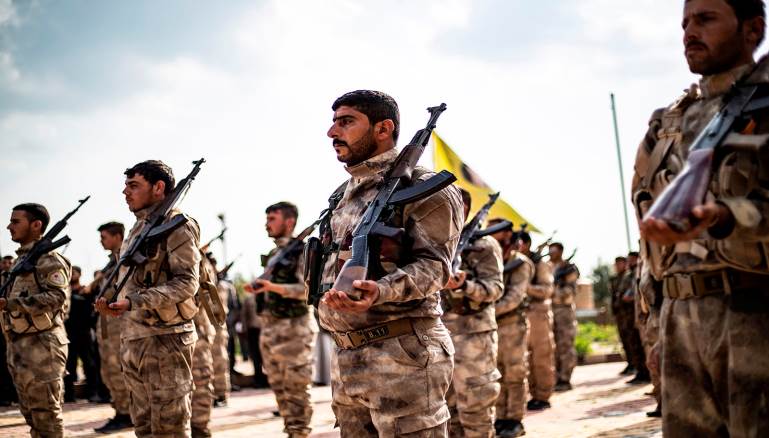Kurdish political official Aldar Khalil announced that he was comfortable with the Turkish-American agreement that aims to establish a joint operations center for northern Syria, but said that the details of the deal were still unclear.
Khalil told the AFP news agency: “This deal may mark the start of a new approach but we still need more details.” He added, “We will evaluate the agreement based on details and facts, not headlines.” He also said Erdogan is “still insisting on eliminating our presence.”
A major Kurdish official in the Self-Administration, Badran Jia Kurd, said that a Turkish attack on Kurdish forces in northeastern Syria would create a “large scale war” if the United States efforts to stop Ankara’s plans failed.
Jia Kurd told Reuters that if there was an attack it would be on the forces positioned on the border with Turkey and that they would then not be able to pursue Islamic State sleeper cells or guard the thousands of prisoners from the organization.
Turkey and the United States have disagreed for months over the proposed “safe zone” in northeastern Syria. On Wednesday, they agreed on establishing a joint operations center in Turkey to administer the region, but neither side said that the two major points of dispute, regarding the area of the zone and who would command the forces that would patrol it had been overcome.
Jia Kurd said: “We want a political solution and dialogue” and added, “But if these regional and international efforts are exhausted, then we would find ourselves in a grave military confrontation.”
He added that if there was a Turkish attack it would lead to a “catastrophic conflict” and the officials in the Syrian Democratic Forces would try as much as possible to prevent this from happening through discussions with foreign countries, but that, “European silence does not serve stability, the political solution or the elimination of terrorism, and the Russian position is similarly not serious about impeding any possible attack on our areas.” He added: “On the American side, there are attempts to block the Turkish attack but it needs resolve.”
For his part, Turkish President Recep Tayyip Erdogan said that Turkey had gone along with the American decision to set up an operations center in order to establish a peace corridor in Syria. This came during a press conference with his Ukrainian counterpart Volodymyr Zelensky, on Wednesday in the capital Ankara.
Erdogan said that there had been three days of talks with an American military delegation about the peace corridor in Syria and that these talks had gone positively. The Turkish president said: “It [the peace corridor] will begin to be established, in parallel with the setting up of an operations center with the Americans.”
The American embassy in Ankara said that the Turkish and American delegations had agreed to the following: First, the swift implementation and preliminary measures to ensure removing Turkish security concerns; second, establishing a joint operations center as soon as possible for cooperation and to implement the establishment of a safe zone, with this area acting as a safe crossing (corridor), as well as to carry out all possible efforts to allow displaced Syrian to be able to move to their country.
The Turkish-American military meetings and the latest breakthrough in relations come a week after the arrival of the new US Ambassador, David Satterfield, to Ankara, who had previously been Assistant Secretary of State for Near Eastern Affairs.
This article was translated and edited by The Syrian Observer. The Syrian Observer has not verified the content of this story. Responsibility for the information and views set out in this article lies entirely with the author.


